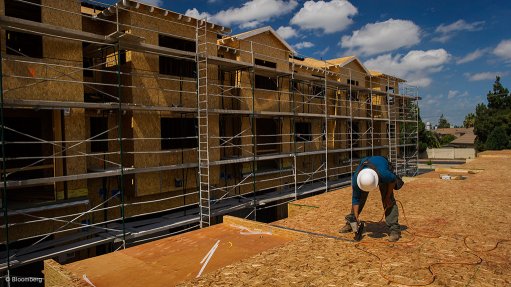
Photo by: Bloomberg
A recent report that analyses First National Bank’s house price indices for full- and sectional-title homes of various sizes has found that the prices of smaller houses are not only accelerating faster but are also showing stronger growth than that of larger houses.
Rode’s Report on the South African Property Market author and property economist Erwin Rode said the prevailing low economic growth environment, as well as the tight credit criteria of banks, could be forcing buyers to scale down the size of house they buy.
“Nevertheless, over the past year, a slight softening in the credit standards of banks seems to have buoyed house prices in general, which explains why they are, in general, again showing growth slightly in excess of inflation,” he outlined.
Rode added, however, that headwinds in the path of house prices remained, citing weak growth in formal employment, waning growth in after-tax household incomes and still-high levels of household debt.
“What’s more, despite the South African Reserve Bank’s decision to keep interest rates steady at the September meeting, the Monetary Policy Committee remains of [the] view that interest rates will have to normalise again,” he said.
Rode added that the South African consumer was under “unrelenting” stress, as evidenced by the finding that residential rentals had been growing at about half that of the inflation rate.
Another key finding of the report was the moderate growth in the market rentals of office space.
“Nationally, [the increasing use of] contracted employment in the services industries continues to undermine the demand for rented office space. The result of this has been vacancy rates that are unable to drop and market rentals that are showing sub-inflation growth,” he commented.
The report further found that, in the second quarter of the year, there had been no growth in market rentals for prime office space in Durban, while in Johannesburg and Pretoria, rentals in decentralised nodes recorded growth of 2%.
In contrast, office rental in decentralised nodes in Cape Town had experienced growth of 5% – the only region in which “real” rentals were able to show growth.
Meanwhile, in the second quarter of the year, market rentals for industrial properties in the Cape Peninsula and on the Gauteng East Rand were still able to show “fairly decent” yearly growth of 6%.
In Central Witwatersrand and in Durban, however, rentals posted growth of roughly 3%.
“As for rental growth prospects, the underperformance of the manufacturing and retail sectors of the economy does not bode well for the demand for manufacturing and warehouse space to rent. The likely outcome of this will be continued modest growth in industrial market rentals,” Rode noted.